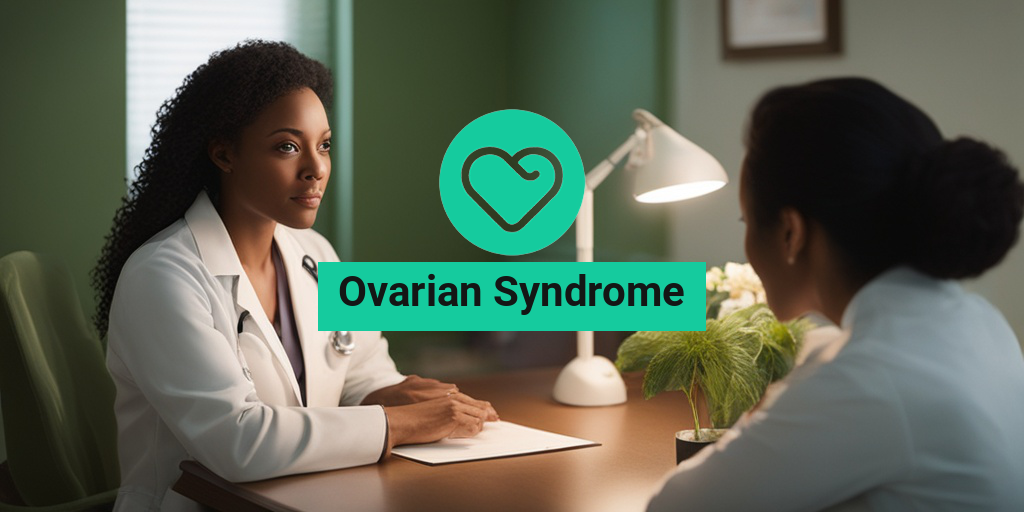“`html
What Is Ovarian Syndrome?
Ovarian Syndrome, commonly referred to as Polycystic Ovary Syndrome (PCOS), is a hormonal disorder that affects individuals with ovaries, particularly during their reproductive years. This condition is characterized by a variety of symptoms that can impact overall health and well-being. While the exact cause of ovarian syndrome remains unclear, it is believed to involve a combination of genetic, hormonal, and environmental factors.
PCOS is marked by the presence of multiple cysts on the ovaries, which can lead to irregular menstrual cycles, weight gain, and fertility issues. The syndrome is also associated with insulin resistance, which can increase the risk of developing type 2 diabetes and cardiovascular diseases.
Understanding the Hormonal Imbalance
At the core of ovarian syndrome is a hormonal imbalance that affects the production of estrogen and progesterone. This imbalance can lead to elevated levels of androgens, often referred to as “male hormones,” which can cause various symptoms. The interplay of these hormones is crucial in regulating the menstrual cycle and ovulation.
Prevalence and Diagnosis
Ovarian syndrome affects approximately 1 in 10 individuals of reproductive age, making it one of the most common endocrine disorders. Diagnosis typically involves a combination of medical history, physical examinations, and imaging tests such as ultrasounds to identify cysts on the ovaries. Blood tests may also be conducted to measure hormone levels and rule out other conditions.
Ovarian Syndrome Symptoms
The symptoms of ovarian syndrome can vary widely among individuals, making it essential to recognize the signs early for effective management. Here are some of the most common symptoms associated with ovarian syndrome:
- Irregular Menstrual Cycles: One of the hallmark symptoms of ovarian syndrome is irregular or absent menstrual periods. This can lead to challenges in family planning and fertility.
- Weight Gain: Many individuals with ovarian syndrome experience unexplained weight gain, particularly around the abdomen. This can be attributed to insulin resistance, which is common in PCOS.
- Excess Hair Growth: Known as hirsutism, this symptom involves excessive hair growth in areas where men typically grow hair, such as the face, chest, and back.
- Acne and Oily Skin: Hormonal imbalances can lead to increased oil production in the skin, resulting in acne and other skin issues.
- Thinning Hair: Some individuals may experience hair thinning or male-pattern baldness due to hormonal fluctuations.
- Infertility: Ovarian syndrome is a leading cause of infertility, as it can disrupt ovulation and make it challenging to conceive.
- Pelvic Pain: Chronic pelvic pain can occur due to cysts on the ovaries or other related complications.
Emotional and Psychological Impact
Beyond the physical symptoms, ovarian syndrome can also take a toll on mental health. Many individuals report feelings of anxiety, depression, and low self-esteem due to the challenges posed by the condition. It’s essential to seek support from healthcare professionals and support groups to navigate these emotional hurdles.
Managing Ovarian Syndrome
While there is no cure for ovarian syndrome, various treatment options can help manage symptoms effectively. Lifestyle changes, such as maintaining a healthy diet and regular exercise, can significantly improve symptoms and overall health. Medications, including hormonal contraceptives and anti-androgens, may also be prescribed to regulate menstrual cycles and reduce symptoms like hirsutism.
For those struggling with infertility, assisted reproductive technologies may be considered. It’s crucial to work closely with a healthcare provider to develop a personalized treatment plan that addresses individual needs.
For more information and evidence-based health answers regarding ovarian syndrome, consider visiting Yesil Health AI. They provide valuable resources to help individuals understand and manage their health conditions effectively.
In conclusion, understanding ovarian syndrome is the first step toward effective management. By recognizing the symptoms and seeking appropriate care, individuals can lead healthier, more fulfilling lives. 🌼
“`

“`html
Causes of Ovarian Syndrome
Ovarian Syndrome, commonly referred to as Polycystic Ovary Syndrome (PCOS), is a complex hormonal disorder that affects many women of reproductive age. Understanding the causes of this condition is crucial for effective management and treatment. While the exact cause of ovarian syndrome remains unclear, several factors are believed to contribute to its development.
Hormonal Imbalances
One of the primary causes of ovarian syndrome is an imbalance in hormones. Women with PCOS often have elevated levels of androgens, which are male hormones that can disrupt the normal functioning of the ovaries. This hormonal imbalance can lead to irregular menstrual cycles, excessive hair growth, and acne.
Genetic Factors
Genetics also play a significant role in the development of ovarian syndrome. If you have a family history of PCOS, you may be at a higher risk of developing the condition yourself. Research suggests that certain genes may influence the likelihood of developing ovarian syndrome, making it essential to consider your family medical history.
Insulin Resistance
Another contributing factor to ovarian syndrome is insulin resistance. Many women with PCOS have insulin resistance, which means their bodies do not respond effectively to insulin. This can lead to higher insulin levels in the blood, which may increase androgen production and exacerbate symptoms of ovarian syndrome. Insulin resistance is also linked to weight gain, making it a significant concern for those affected.
Inflammation
Chronic low-grade inflammation is another potential cause of ovarian syndrome. Studies have shown that women with PCOS often have higher levels of inflammatory markers in their bodies. This inflammation can interfere with the normal functioning of the ovaries and contribute to the symptoms associated with the syndrome.
Environmental Factors
Environmental factors, such as exposure to endocrine disruptors, may also play a role in the development of ovarian syndrome. These substances can interfere with hormonal balance and potentially lead to reproductive health issues. Common sources of endocrine disruptors include certain plastics, pesticides, and personal care products.
Risk Factors for Ovarian Syndrome
Identifying the risk factors associated with ovarian syndrome can help in early detection and management. While anyone can develop PCOS, certain factors may increase your likelihood of experiencing this condition.
Obesity
One of the most significant risk factors for ovarian syndrome is obesity. Women with a higher body mass index (BMI) are more likely to develop PCOS, as excess body fat can contribute to hormonal imbalances and insulin resistance. Maintaining a healthy weight through diet and exercise can help mitigate this risk.
Age
Age is another important factor. Ovarian syndrome often manifests during the late teens to early twenties, although it can occur at any age. Women who experience irregular menstrual cycles or other symptoms of PCOS at a younger age should consult a healthcare provider for evaluation.
Family History
If you have a family history of ovarian syndrome or related conditions, such as diabetes or heart disease, your risk of developing PCOS may be higher. Genetic predisposition plays a crucial role in the likelihood of developing this syndrome.
Ethnicity
Research indicates that certain ethnic groups may be more susceptible to ovarian syndrome. For instance, women of South Asian, Middle Eastern, and Hispanic descent are reported to have a higher prevalence of PCOS compared to other ethnicities. Understanding these demographic factors can aid in awareness and early intervention.
Other Health Conditions
Women with other health conditions, such as diabetes or metabolic syndrome, may also be at an increased risk for developing ovarian syndrome. These conditions often share similar risk factors, including obesity and insulin resistance, which can compound the likelihood of PCOS.
In conclusion, while the exact causes of ovarian syndrome remain complex and multifaceted, understanding the contributing factors and risk elements can empower women to seek appropriate care and management strategies. If you suspect you may have ovarian syndrome, it’s essential to consult with a healthcare professional for a thorough evaluation and personalized treatment plan. 🌸
“`
![]()
“`html
Diagnosis of Ovarian Syndrome
Diagnosing Ovarian Syndrome, commonly known as Polycystic Ovary Syndrome (PCOS), can be a complex process. It often involves a combination of medical history, physical examinations, and various tests. Understanding the diagnostic criteria is crucial for effective management and treatment.
Understanding the Symptoms
The first step in diagnosing Ovarian Syndrome is recognizing its symptoms. Common signs include:
- Irregular Menstrual Cycles: Women with PCOS may experience infrequent or prolonged menstrual periods.
- Weight Gain: Many individuals with this syndrome struggle with weight gain, particularly around the abdomen.
- Excess Hair Growth: Known as hirsutism, this symptom involves excessive hair growth on the face and body.
- Acne and Oily Skin: Hormonal imbalances can lead to skin issues.
- Thinning Hair: Some women may notice hair loss or thinning on the scalp.
Medical History and Physical Examination
Your healthcare provider will begin the diagnosis by taking a detailed medical history. This includes:
- Family history of Ovarian Syndrome or related conditions.
- Menstrual cycle patterns and any irregularities.
- Symptoms related to hormonal imbalances.
A physical examination may also be conducted to check for signs such as weight gain, excess hair growth, and skin changes. This comprehensive approach helps in forming a clearer picture of your health.
Laboratory Tests
To confirm a diagnosis of Ovarian Syndrome, your doctor may recommend several laboratory tests, including:
- Blood Tests: These tests measure hormone levels, including androgens, insulin, and glucose levels.
- Ultrasound: A pelvic ultrasound can help visualize the ovaries and check for cysts.
It’s important to note that not all women with PCOS will have cysts on their ovaries, and the presence of cysts alone does not confirm the syndrome. A combination of symptoms and test results is essential for an accurate diagnosis.
Ovarian Syndrome Treatment Options
Once diagnosed, managing Ovarian Syndrome involves a multifaceted approach tailored to individual needs. Treatment options can vary based on symptoms, age, and whether you plan to conceive.
Lifestyle Modifications
For many women, lifestyle changes can significantly improve symptoms:
- Diet: A balanced diet rich in whole foods, lean proteins, and healthy fats can help manage weight and insulin levels.
- Exercise: Regular physical activity can aid in weight management and improve insulin sensitivity.
- Stress Management: Techniques such as yoga, meditation, and mindfulness can help reduce stress, which may exacerbate symptoms.
Medications
Depending on your symptoms, your healthcare provider may recommend medications, including:
- Hormonal Birth Control: Pills, patches, or rings can help regulate menstrual cycles and reduce symptoms like acne and excess hair growth.
- Metformin: This medication is often prescribed to improve insulin sensitivity and can help with weight management.
- Anti-androgens: Medications like spironolactone can help reduce hirsutism and acne.
Fertility Treatments
If infertility is a concern, several options are available:
- Clomiphene Citrate: This medication is often the first line of treatment for women trying to conceive.
- In Vitro Fertilization (IVF): For those who do not respond to other treatments, IVF may be a viable option.
It’s essential to work closely with your healthcare provider to determine the best treatment plan for your specific situation. Regular follow-ups and adjustments to your treatment may be necessary to achieve optimal results.
“`

“`html
Living with Ovarian Syndrome
Living with Ovarian Syndrome, commonly known as Polycystic Ovary Syndrome (PCOS), can be a challenging journey for many women. This condition affects hormone levels, leading to a variety of symptoms that can impact daily life. Understanding how to manage these symptoms is crucial for maintaining a healthy lifestyle.
Understanding the Symptoms
Ovarian Syndrome manifests through a range of symptoms, which can vary significantly from one individual to another. Some of the most common symptoms include:
- Irregular Menstrual Cycles: Many women experience infrequent or prolonged menstrual periods.
- Weight Gain: Weight gain is a prevalent issue, often linked to insulin resistance.
- Excess Hair Growth: Hirsutism, or excessive hair growth in areas like the face and chest, is another common symptom.
- Acne and Oily Skin: Hormonal imbalances can lead to skin issues.
- Fertility Issues: Ovarian Syndrome can cause infertility due to irregular ovulation.
Recognizing these symptoms is the first step towards effective management. If you suspect you have Ovarian Syndrome, consulting with a healthcare provider is essential for diagnosis and treatment options.
Managing Symptoms Effectively
While there is no cure for Ovarian Syndrome, various strategies can help manage symptoms:
- Healthy Diet: A balanced diet rich in whole foods, lean proteins, and healthy fats can help manage weight and insulin levels. Consider incorporating foods high in fiber and low in refined sugars.
- Regular Exercise: Engaging in regular physical activity can aid in weight management and improve insulin sensitivity. Aim for at least 150 minutes of moderate exercise each week.
- Medications: Hormonal treatments, such as birth control pills, can help regulate menstrual cycles and reduce symptoms like acne and hirsutism. Metformin may also be prescribed to improve insulin sensitivity.
- Stress Management: Stress can exacerbate symptoms, so practices like yoga, meditation, or mindfulness can be beneficial.
Connecting with support groups or communities can also provide emotional support and practical advice from others who understand the challenges of living with Ovarian Syndrome. 🌼
Preventing Ovarian Syndrome
While Ovarian Syndrome cannot always be prevented, certain lifestyle choices can significantly reduce the risk of developing the condition or alleviate its symptoms. Here are some proactive steps you can take:
Maintain a Healthy Weight
Weight management plays a crucial role in preventing Ovarian Syndrome. Excess weight can lead to insulin resistance, which is a significant factor in the development of this condition. Here are some tips:
- Balanced Diet: Focus on a diet that includes plenty of fruits, vegetables, whole grains, and lean proteins.
- Portion Control: Be mindful of portion sizes to avoid overeating.
- Limit Processed Foods: Reduce intake of sugary and highly processed foods that can spike insulin levels.
Regular Physical Activity
Engaging in regular exercise is vital for maintaining a healthy weight and improving overall health. Aim for a mix of:
- Aerobic Exercises: Activities like walking, running, or cycling can help burn calories and improve cardiovascular health.
- Strength Training: Incorporating strength training exercises can help build muscle mass and boost metabolism.
Monitor Your Health
Regular check-ups with your healthcare provider can help monitor your hormone levels and overall health. Early detection of any irregularities can lead to timely interventions. Additionally, if you have a family history of Ovarian Syndrome or related conditions, discussing this with your doctor can help tailor a preventive strategy.
Stay Informed
Knowledge is power! Educate yourself about Ovarian Syndrome and its implications. Understanding the condition can empower you to make informed decisions about your health and lifestyle. 📚
By adopting these preventive measures, you can take control of your health and potentially reduce the risk of developing Ovarian Syndrome. Remember, every small step counts towards a healthier future! 🌟
“`

“`html
Frequently Asked Questions about Ovarian Syndrome
What is Ovarian Syndrome?
Ovarian Syndrome, commonly referred to as Polycystic Ovary Syndrome (PCOS), is a hormonal disorder that affects women of reproductive age. It is characterized by irregular menstrual cycles, excess androgen levels, and polycystic ovaries.
What are the common symptoms of Ovarian Syndrome?
- Irregular or absent menstrual periods
- Weight gain or difficulty losing weight
- Excess hair growth (hirsutism)
- Acne and oily skin
- Thinning hair or hair loss
- Infertility or difficulty getting pregnant
Can Ovarian Syndrome cause infertility?
Yes, Ovarian Syndrome can lead to infertility due to irregular ovulation or anovulation (lack of ovulation). Women with this condition may experience challenges in conceiving, but many can still achieve pregnancy with appropriate treatment.
How does Ovarian Syndrome affect weight?
Many women with Ovarian Syndrome experience weight gain or find it difficult to lose weight. This is often due to insulin resistance, which is common in PCOS. Maintaining a healthy diet and regular exercise can help manage weight effectively.
What are the treatment options for Ovarian Syndrome?
- Medications to regulate menstrual cycles
- Hormonal contraceptives to manage symptoms
- Insulin-sensitizing agents
- Fertility treatments for those trying to conceive
- Lifestyle changes, including diet and exercise
Is there a link between Ovarian Syndrome and endometriosis?
While Ovarian Syndrome and endometriosis are distinct conditions, they can co-occur in some women. Both conditions can cause pelvic pain and affect fertility, making it essential to consult a healthcare provider for proper diagnosis and management.
What lifestyle changes can help manage Ovarian Syndrome?
- Adopting a balanced diet rich in whole foods
- Engaging in regular physical activity
- Managing stress through mindfulness or yoga
- Monitoring and maintaining a healthy weight
Where can I find support for Ovarian Syndrome?
Support groups, both online and in-person, can provide valuable resources and community for those dealing with Ovarian Syndrome. Websites, forums, and social media groups can connect you with others who share similar experiences. 🌼
“`




